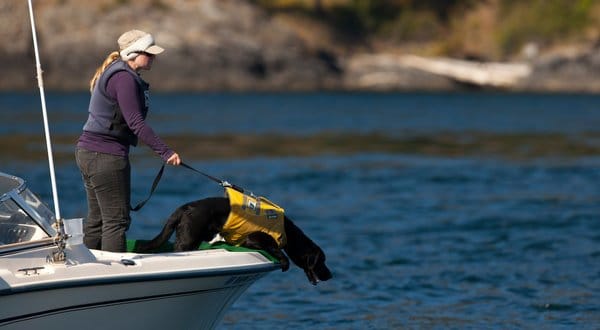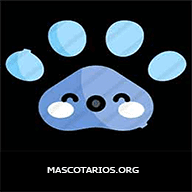This beautiful story is set in the San Juan Islands, an archipelago of coastal islands located on the North-West coast of the United States, in the State of Washington. The archipelago consists of eleven Islands: Orcas with 148 km², San Juan with 142,59 km², Lopez with 77,2 km², Lummi with 23,97 km², Guemes with 21,58 km², Shaw with 19,95 km², Blakely with 16,85 km², Cypress with 16,12 km², Waldron with 11,9 km², Decatur with 9,12 km², Stuart with 7,46 km².
Off the coast of the San Juan Islands, a dog named Tucker with a somewhat sad past as a vagabond on the streets of Seattle has become an undisputed star in the kingdom of canines who contribute their wisdom and help science.
Today Tucker is the only dog in the world that works with marine biologists, able to find and follow the traces of excrement orca to open sea. It is able to follow the trail of the stool up to a mile away, and in small quantities. Spectacular.
Tucker is an 8-year-old black Labrador Retriever mix who – fortunately- He was rescued from the streets of Seattle, an afternoon that in his street walks ended up on the prow of the ship of the group of scientists with which he currently works. That added to his obsession to an orange ball hooked a rope was the beginning of his reputation as a protector of whales and orcas. With that ball he plays wildly after a long and successful search in the water.
Love of the water work (Although curiously, He doesn't really like swimming..., but yes follow traces) and the love of his ball have been key elements for the conservation, protection and surveillance of the health of whales, a group in danger of extinction which is probably is one of the most studied populations of animals in the world.
to most of the, approximately, 85 copies of orcas or killer whales that frequent the Islands San Juan (almost two hours Northwest of Seattle), tracked them the decades, the genotype is known, their years of birth and the number of descendants, etc. But none of that would be so easy (or possible) without the help of Tucker, their special sense of smell, his temperament and the number of tricks he has taught scientists.
Deborah A.. Giles, member of the team of scientists is finishing his doctorate with a work that provides very interesting data on how the orcas that visit the area are affected by the thousands of whale watchers and dozens of commercial ships that gather around the animals. She was the first person to see Tucker as she was working on the ship when the dog appeared on the bow with a "killer whale poop doesn't really smell that bad" face.. He thinks that it is a very expressive and subtle dog.
Then, Elizabeth Seely (coach of working dogs for conservation of nature and research for endangered species) worked with Tucker for four years and it wasn't hard.
But what is difficult is Tucker's work, because, for example, a dog that sniffs narcotics tied with the belt it can lead to the human to the place of the trail and where Tucker research vessel converted, in effect, the legs of your dog when it has picked up the scent, because he physically cannot go to where the sample is, but somehow you have to notify you where you want to go the boat, looking for feces found somewhere in the water. Yes, is an adventure.
Each output is like a visit to the Oracle at Delphi in which each expression must be interpreted by the acolytes, Tucker could lean to the side of the ship, and then another, and suddenly it sinks back into the mat of the smell of excrement lost, with the head between the legs but that small track into his nostrils immediately leads the group to the right place and all must follow the marked trail. “Less contraction of the ear is important”, presents Elizabeth Seely, her coach and must be able to read their signals.
For Tucker, However, highest emotion reduced to his toy: the orange ball. There he displays all his passions, Air nozzle, do neck rotations, he flips it with joy. Why always traveling with him on the boat and when a fecal sample is found, the researchers reward him by giving him the ball at the last second, which reinforces the connection between work and reward.
To finish, We tell you that Tucker will not be the only dog in the scientific world, have a colleague in full training a dog named Sadie to Flat-Coated Retriever breed, was donated by her owner to the program as she could no longer cope with Sadie's attachment to her ball. It was a desperate and hopeless obsession, then one day the owner placed that ball on top of the fridge before going to work, but eight hours later he came home and Sadie was still sitting in the same place looking at the ball.
“When the owner told me that story, my immediate response was: we take it", said Professor Samuel K. Wasser, director of the Center for Conservation Biology at the University of Washington and the orca research project on which Tucker works. Research, financed by Washington Sea Grant of Administration National Oceanic and atmospheric, It raises new questions about how to protect orcas.
Y, as to close one Strawberry for this cake. Despite having blood Labrador Retriever and its hundreds of hours in boats, Tucker not like them to get wet. He hates swimming. The Sra. Seely, not sure why, but guesses it could be due to puppy trauma. It is something that we will never know…
We leave the link to a video for you to see Tucker in action: See video (opens in a new tab).
Source: NYTimes.com

